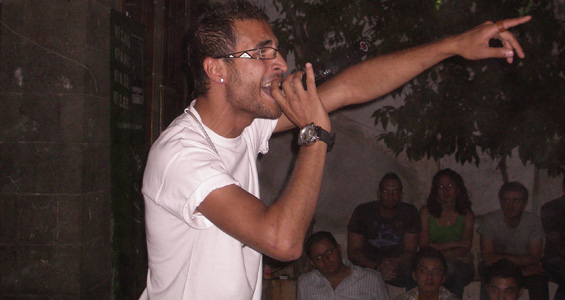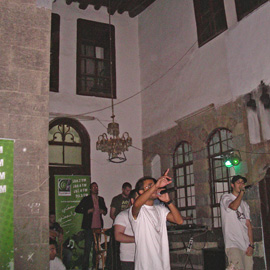Syrian rappers hop to controversy
Hip Hop collides head-on with traditional Arabic music in Damascus.

 |
| Hosam Essa, of Syria’s rap band Sham MCs, performing at the launch party for their debut album |
A group of young Syrians have just released the country’s first rap album and walked straight into controversy.
Sham MCs, a collective of nine rappers, and their debut album Crossword has provoked more than a few cross words in Damascus.
Keep reading
list of 4 items‘Nothing left’: How climate change pushes Indigenous people from their land
‘Refuge of the last dreamers’: Luang Prabang, a city suspended in time
Canadian Nobel-winning author Alice Munro dies aged 92
This is the modern crashing head-on into the traditional. The album launch was held in a centuries-old, traditionally Arabesque house; Sham MCs insist their sound has a home-grown Arab style, and is not a cheap American import.
And in a country where there were protests at the opening of the first branch of Kentucky Fried Chicken, that is an important distinction to make.
Dressed in baggy jeans, and speaking in a heavy American accent, rapper Hosam Essa – known to his fans as Mic Son – says there has been an angry reaction.
“The second track [on the album] is called Against the Flow, [because] it’s like we’re going against everybody’s idea and they hate rap because it’s like a Western thing.”
Tough beat to sell
 |
| A traditional Syrian home served as the setting for the launch of the album Crossword |
Essa struggled to learn English in school, so he used his US-made hip-hop CDs as tutorials. He claims that Sham MCs are not just repeating things his American heroes have said.
“We add that vibe that mixes English and Arabic together, we add our ideas.”
But even Essa’s parents are not convinced: “Sometimes my father will criticise my appearance, he’ll say … I feel embarrassed.
“People have been mocking this music, saying this is a joke or something,” he adds.
Simon Mreish from Syria’s Higher Institute of Music – the Conservatory – rejects the idea that rap is a purely American style: “Music is not owned by [one country],” he says.
But he admits that hip-hop in Syria faces an uphill struggle.
“Our market is ready for a lot of kinds of music but it needs to be marketed in a good healthy way.”
So far, however, record labels have been reluctant to sign Arab rap stars. One of the problems is that the musical establishment in the region is rooted in the classical – the Conservatory refuses to touch modern music, forcing performers to treat their work as a hobby.
“We don’t have schools for modern music like pop or jazz, the only way to learn music is the Conservatory, but inside the Conservatory you can find a lot of professional musicians doing their own projects,” says Mreish.
Hip-hopping migration?
Essa knows he is unlikely to make a career out of rapping in Syria – he spends his days in college studying finance and accounting and he realises he will probably have to leave the country to make it big as a hip-hop star.
“If I stayed here I won’t be a rapper,” he says, “Outside they understand more. Here when I’m rapping, I feel like nobody understands.”
Some Arab rap has found limited success in the West. The Palestinian group DAM is the most high-profile hip-hop act to emerge from the region. Their success is partly attributed to their heavily political messages about Israeli occupation.
Another Palestinian trio, Ramallah Underground, is currently touring Europe.
Stormtrap from Ramallah Underground says their music has struck a chord in the West: “Our music has definitely spread an old message with a new sound across the West, and got a lot of people more interested in the art scene and the history and experience of Palestine.”
Linguistic low note
Sham MCs are stuck between an Arab audience which seems to be reacting against them, and a Western audience which will not understand them.
Mreish says this is the dilemma Arab rappers face: “If you are using Arabic lyrics, it would be difficult to convey this message worldwide,” he says, “but if they want to market themselves in the Arab world it’s better to sing in Arabic.”
So for now, Sham MCs are concentrating on changing attitudes at home. They have built up a small but loyal following. Their fans pack the courtyard at their launch party, screaming when the group comes on stage, and singing every word back to them.
But they are desperately trying to move into the mainstream. This summer they became the first rappers to perform at a Syrian festival, taking to the stage alongside the country’s most popular singer George Wassouf.
And to celebrate the end of Ramadan, they took their music on a three-day Eid tour of Syria. They performed at venues normally reserved for the likes of Wassouf.
As the traditional jingles with the modern and western, Essam hopes Sham MCs is charting a way ahead for other groups.
“We want to change how people look at rap music,” he says.
“We want to tell them that we can do something.”